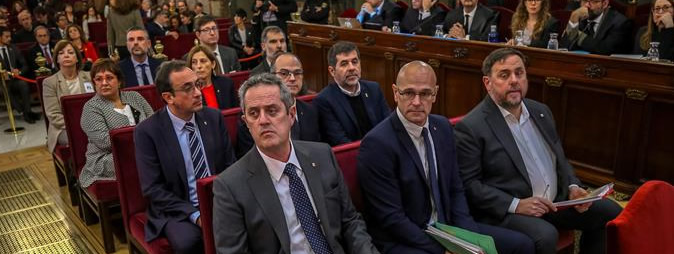13.02.2019 - 15:13
|
Actualització: 13.02.2019 - 16:13
Half of the former Catalan government sitting in the dock at one of the highest state courts – for some, the first time they had been seen in over a year. This unusual image is set to be one of the most memorable of 2019, although it is sure not to be the last.
A daily trip
February 12 marked the first day of the trial against the Catalan referendum and declaration of independence, and the beginning of what promises to be a complex legal proceeding lasting several months held at the Spanish Supreme Court.
There are 12 pro-independence leaders being prosecuted, and all but three are being held in detention in the Madrid area, a one-hour-trip to and from the courtroom. By 9am on Tuesday, the prisoners had all been transported to the where they would be spending around ten hours – a trip they will be making every day of the trial.
Some leaders jailed for over a year
Some of those on trial – activists Jordi Sànchez and Jordi Cuixart – have been in prison for over a year. Days after them, former vice president Oriol Junqueras and former minister Joaquim Forn entered prison, held until now and with almost no footage of them released to the public.
Meanwhile, other officials in precautionary prison were released and then incarcerated again, such as former ministers Jordi Turull, Josep Rull, Raül Romeva, and former parliament speaker Carme Forcadell.
600 accredited journalists
Already in the early hours of the first day, there was a crowd outside the Madrid building, including scores of journalists. As many as 600 professionals are accredited for the duration of the trial, from 150 media outlets – 50 of which are international.
Reporters from such outlets such as the New York Times, the BBC, Al Jazeera and more were in attendance, as well as correspondents for media from Sweden, Flanders, Portugal, or the Francophone and Arab-speaking world.
Observers gain access as public
The morning hours also saw a long line of people waiting to get in – among these, were international observers. Officially denied attendance as such by the courts, some observers were however ultimately able to gain access to the trial as members of the public.
The morning additionally saw various politicians and officials in attendance – including the Catalan president and vice president and other members of the government, members of various associations, and Barcelona city officials.
Family access denied
The wives, husbands, siblings, and children of the prosecuted leaders arrived to the courtroom shortly after their family members. Many have been in the public eye, active in rallying support for the accused and raising awareness of the trial, often appearing at protests together or reading letters on behalf of their relatives.
This morning scene saw some confusion, though, as some were originally thought to not be on the list of those allowed access to the premises, although they were ultimately able to go in with help from lawyers who were with them. “We’re already nervous enough,” said the wife of Raül Romeva about the incident.


